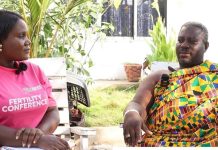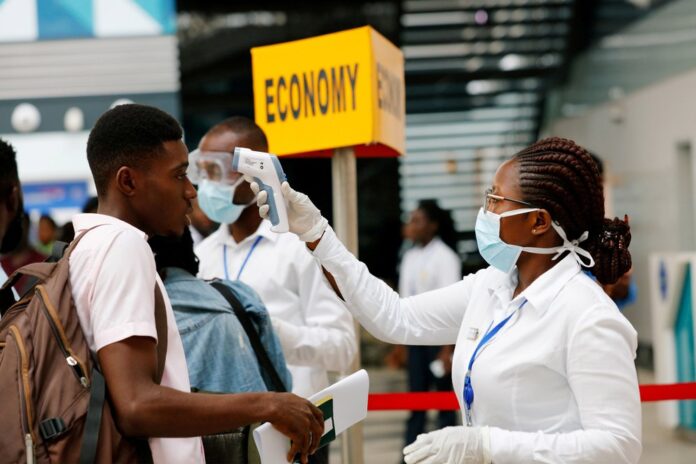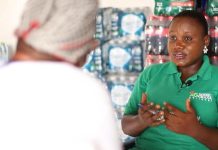“Don’t throw the baby out with the bathwater”
“Anyone who has never made a mistake has never tried anything new”.
~Albert Einstein
“Mistakes are always forgivable if one has the courage to admit them”
– Bruce LEE
Early in the COVID-19 pandemic, Ghana’s response was hailed as one of the best among African countries; in particular its innovative testing approach and science-driven political leadership.
Ghana’s COVID-19 response approach, in general, has been a success in minimizing the impact of the pandemic.
Multidisciplinary leadership with all stakeholders, His Excellency the President, Nana Addo Dankwa Akufo-Addo and his advisor on health, hardworking Minister of Health and deputies, Director of Health Services, not forgetting the director of Health promotion who chaired the Covid Management Team as well as all health professionals nationwide we say a big thank you.
Coronavirus continues to spread worldwide with more than 192 million confirmed cases across 220 countries and territories with over 4 million deaths as at 20th July 2021.
For nearly 18 months, governments and societies have been turned inwards to fight an invisible enemy, exposing competing structures, struggling to have vaccines to protect their beloved citizens, vulnerabilities, and political priorities.
Ghana embarked on intense actions to contain the coronavirus outbreak since the first two cases were confirmed on 12 March 2020. Public health measures such as the mandatory wearing of nose masks in public places, social distancing, and hand hygiene were instituted to curtail the spread of the virus.
For optimal care of those infected with coronavirus, various guidelines were adapted and isolation/treatment facilities were quickly identified and equipped to receive and manage suspected and confirmed cases.
However, as the pandemic raged on, it became evident that more needed to be done to adequately equip treatment facilities especially those managing severe to critical Covid-19 patients to improve clinical outcomes and reduce case fatality rates.
Moreover treatment facilities in all 16 regions of Ghana have received critical medical supplies such as oxygen concentrators, patient monitors, arterial blood gas analyzers, electrocardiograms, nasal oxygen cannulas, and pulse Some 360 multidisciplinary health staff were also trained to effectively manage Covid-19 patients in isolation, treatment facilities and at home.
Today, Ghana’s health system has improved capacity to monitor and manage diseases requiring intensive care. Consequently, a greater proportion of those infected with Covid-19 requiring intensive care and ventilator support have higher chances of survival.
Ghana governments resorted to pronouncing directives and touting the implementing of a targeted and proactive so-called approach of ‘Tracing,’ ‘Testing,’ and ‘Treatment’ as its primary COVID-19 response – where ‘Tracing’ means aggressive contact tracing to identify infected and high-risk people in the communities; Testing means enhancing the testing capacity of the country; Treatment means isolating and treating persons who have tested positive.
This targeted approach has helped trace and track high-risk individuals, accounting for its response success so far as exemplified by the lowest casualty rate.
An efficient, pragmatic, and science-driven public health policy approach was implemented by the multidisciplinary team led by the Ghana Minister of Health Honourable Agyeman Manu 1/ limit and stop the importation of new cases.
Before recording its first two COVID-19 cases on 12 March 2020, Ghana implemented measures to prevent the pandemic from entering the country. The initial step was the decision not to evacuate Ghanaians stranded in the epicenter in Wuhan, China. The government also banned all travels of state officials.
After the first recorded case, the President in a public address on 15 March outlined measures to curtail the spread of the virus. Amongst the measures were restrictions on entry into Ghana by other nationals (except for resident permit holders) travelling from countries that have recorded at least 200 coronavirus cases and mandatory 14-day self-quarantine for persons who are otherwise allowed to enter Ghanaian territory [4].
The rise of imported cases compelled the President to order the closure of the country’s borders to human traffic effective midnight, 22 March. The decision to close down Ghana’s borders and the mandatory quarantine helped curtail imported cases as 105 cases were recorded from arrivals
2/Prevent community spread
. Markets and lorry terminals across the country were fumigated. However, in the wake of reported community spread, a law (Imposition of Restrictions Act, 2020 [Act 1012]), was passed on 21 March 2020 to restrict movement. A partial restriction of movement was imposed on the two most populous cities (Accra and Kumasi), restricting non-essential service persons’ movement for two weeks.
The aim was to help scale-up contact tracing of persons who have come into contact with infected persons to test them and, if necessary, isolate and quarantine them for treatment [6]. All public gatherings, including conferences, funerals, festivals, and religious activities, were also banned for four weeks and has since been extended to 31 May. However, private burials could be held with a maximum of 25 people while observing the social distance of one-meter. Furthermore, schools were authorized to shut down. All establishments, including supermarkets and restaurants, were charged to observe enhanced COVID-19 hygiene protocols put forward by WHO.
3/ Isolate, treat, and take care of the sick
The government has created new isolation and treatment centers. The purpose is to immediately isolate suspected cases and those infected with the virus to minimize community spread.
Government efforts have been boosted by the private sector and other civil organizations like the church. Through the private sector, the government put up a 100-bed hospital completed within six weeks for the isolation and treatment of COVID-19 patients.
4/Ensure self-reliance and expand the domestic capability
The government is championing local innovation and production of Personal Protection Equipment’s (PPEs), development of test kits, and equipping existing state laboratories. The Ministry of Trade and Industry has since selected some manufacturing companies to produce sufficient PPEs for the frontline health workers locally.
Commercial banks, with the support of the Bank of Ghana, have since granted a credit facility and stimulus package of GH¢3 billion to local companies, particularly those in the pharmaceutical, health, services, and manufacturing industries to cushion their production efforts.
Additionally, to protect all health personnel at the forefront of the pandemic fight, an insurance package has been instituted for them. All health workers have also been exempted from taxes on their emoluments for three months. Additionally, all frontline health workers will receive an additional allowance of 50% of their basic salary within the same period.
The Ministry of Transport is also making available, for free, buses to shuttle health workers to and from work along specific routes. The Ministry of Gender, Children, and Social Protection has educated Ghanaians on how to make hand sanitizers at home
5/Limit the impact on social and economic life
To minimize the pandemic’s social and economic impact, the Corona virus Alleviation Program bill was passed as a resilience and recovery plan to boost businesses and households. On the 26 March 2020, the government announced the absorption, for three months, the water bills of all Ghanaians, and the electricity bills of all lifeline customers, and provided a 50% subsidy for all other customers.
The government has also extended the tax filing date from April to June. Further, through negotiations with the banks, a 2% reduction of interest rates by banks was agreed on, effective April 2020.
Additionally, banks have granted a six-month moratorium of principal repayments to entities in the airline and hospitality industries, i.e., hotels, restaurants, car rentals, food vendors, taxis operators, among others [13].
Besides, a GH¢600 million soft loan scheme has been offered to Micro, Small and Medium Businesses in the country. The scheme is expected to have a one-year moratorium and two-year rep
6/Acquisition of COVID-19 vaccines to protect Ghanaians from a range of sources to support Ghana’s target to vaccinate 20 million people.
Currently 1,271,393 Total Vaccine Doses Administered, 865,422 first dose, 405,971 first & second doses as at 14th July 2021.
The world should learn from the most successful strategies for testing, quarantine, public communication and economic support.
A successful response to Covid-19 turned out to depend on more than a country’s wealth, scientific prowess and history of public health successes. The U.S. enjoys all of these advantages but mounted one of the worst responses to the pandemic: 1 in every 990 Americans has died from Covid-19 since the pandemic began. Bad politics, quite simply, can trump good public health
We are very greatful to Ghanaian leaders, his Excellency Nana Addo Dankwa Akufo-Addo, Health Advisor to the President, hardworking Health Minister Honourable Agyeman Manu, Director of Health Services, Director of Health Promotion and all Health professionals nationwide working 24/7 to inform, prevent, detect, trace, isolate, treat, inoculate or vaccinate Ghanaians to protect all.
Hon. Kwaku Agyeman-Manu who also serves on the executive board of the World Health Organization (WHO) is working 24/7 in saving lives and protecting people in Ghana and boosting the COVID-19 response.
During this COVID-19 pandemic, Ghana’s response is hailed as one of the best among African countries; in particular its innovative testing approach and science-driven political leadership.
God Bless our Homeland Ghana
Frederick A. ADDO
President, A.C.G.I.E (Association of Concerned Ghanaians in Europe for Human Rights and Democratic Governance)
also Clinical Research Consultant in France.












































